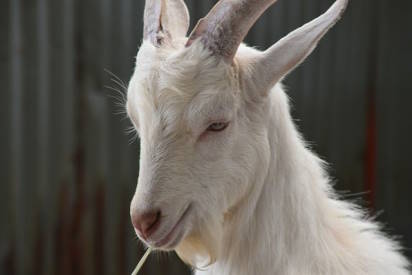Goats are fascinating creatures. I’ve often found myself continually seeking the best dietary solutions for them, which is how I stumbled upon the question: can goats eat silage? The answer is a resounding yes, but as with all things, there’s more to the story.
As a goat owner, I understand the challenges of ensuring our agile friends receive a balanced, nutritious diet, especially during times when fresh forage is scarce. Silage presents an intriguing solution, not just as a supplementary feed but as a potential cornerstone of a goat’s diet.
In this article, we’ll dive deep into the world of silage, unpacking its nature, benefits, and the nuances of introducing it to our goats. Whether you’re a seasoned goat farmer or just starting, there’s always something new to learn about these captivating animals and their dietary needs.

Understanding Silage
Every livestock owner knows that the right feed is the backbone of healthy, productive animals. But when it comes to unconventional feeds like silage, there are often questions about its nature, preparation, and benefits. In this section, we’ll unpack what silage is, its different types, and the processes that go into its creation.
What is Silage?
At its core, silage is preserved pasture. Through the process of fermentation, high-moisture crops can be stored for extended periods without succumbing to rot. This preservation technique not only prolongs the shelf life of the forage but can also enhance its nutritional content.
Types of Silage
The silage variety one chooses often correlates with the availability of crops and the nutritional requirements of the livestock being fed. Common types encompass grass silage and maize silage. However, depending on the region and local agricultural practices, there can also be silage made from oats, barley, rye, or even leguminous plants.
The Fermentation Process
Central to silage’s preservation is the fermentation process. When crops are stored in an oxygen-limited environment, beneficial bacteria break down the plant sugars into acids. This acid-rich environment prevents harmful bacteria and fungi from proliferating, ensuring the crops remain preserved and nutritious.
Benefits Over Fresh Feed
While fresh feed is always a top choice, it’s not always available year-round. Silage fills this gap, ensuring livestock have access to nutritious feed even in lean seasons. Plus, the fermentation can sometimes boost the availability of certain nutrients, making it not just a backup option but a potent dietary supplement in its own right.
[GoatAffiliate]
The Goat’s Digestive System
To understand the compatibility of silage with goats, a brief overview of their digestive system is necessary. Let’s explore how goats process their food and their natural dietary preferences.
How Goats Digest Food
Goats are ruminants, meaning they possess a specialized stomach known as the rumen. This stomach allows them to break down challenging plant materials thanks to beneficial bacteria that assist in fermenting and digesting fibrous foods.
Natural Dietary Preferences of Goats
In the wild, goats prefer grazing on shrubs, bushes, and woody plants. However, domesticated goats have incorporated hay, grains, and, occasionally, kitchen scraps into their diets.
Benefits of Silage for Goats

In the world of livestock nutrition, silage has established itself as a staple for various reasons. But when it comes to goats, a unique set of advantages presents itself. Let’s explore the multifaceted benefits of silage for these agile ruminants.
Nutritional Boost
One of the primary reasons farmers turn to silage is the enriched nutrition it offers. Silage, especially when prepared from high-quality crops, provides a robust mix of vitamins, minerals, and, often, proteins. During times when fresh forage is scarce, silage can act as a vital nutritional bridge, ensuring that goats don’t suffer from any dietary deficiencies.
Economic and Resource Efficiency
In the long run, silage can be a cost-effective feeding solution. Preparing silage might require an initial investment, but when balanced against the price fluctuations and availability of fresh forage, it often comes out ahead. Moreover, silage allows farmers to make full use of crop harvests, reducing waste and ensuring that nothing goes to waste.
Enhanced Digestibility for Goats
Due to its fermentation process, silage can be easier for goats to digest. The fermentation breaks down complex components in the forage, allowing goats to extract more nutrients with less effort. This can be especially advantageous for younger or weaker goats that need easily digestible feeds.
Year-Round Feed Security
Weather uncertainties, seasonal changes, and unexpected shortages can disrupt a goat’s steady diet. Silage, with its extended shelf life and resistance to spoilage, guarantees a consistent feed supply throughout the year. This consistency can help in maintaining the health, weight, and productivity of a goat herd, irrespective of external conditions.
Versatility in Dietary Planning
Silage doesn’t just stand alone. It can be mixed with other feeds, offering flexibility in dietary planning. Depending on the specific needs of the herd – whether it’s growth, lactation, or maintenance – farmers can adjust the mix of silage with other feeds to achieve the desired nutritional profile.
Potential Issues with Feeding Goats Silage

Like every dietary change, introducing silage comes with its challenges. Let’s delve into some of the potential complications that might arise.
Digestive Concerns
Improperly fermented silage might upset a goat’s digestive system. Symptoms can range from bloating and diarrhea to lethargy and reduced appetite.
Quality and Quantity Matters
It’s crucial to ensure that the silage type is suitable for goats. Overfeeding can also lead to weight gain and other complications.
Tips for Safely Introducing Silage to a Goat’s Diet

Are you considering introducing silage to your goats? A thoughtful and measured approach can ensure a smooth transition.
Gradual Introduction
Start by mixing a small quantity of silage with their regular feed, increasing the portion gradually over several days.
Monitoring and Adjusting
Monitor your goat’s health throughout this process. An active and contented goat usually indicates a well-received diet. Seek veterinary advice at the first sign of any concerning symptoms.
What Other Animal Fodder Can Goats Eat Apart from Silage?

Diversifying a goat’s diet not only ensures they receive a range of nutrients but also caters to their natural curiosity and varied palate. While silage is a fantastic option, it’s by no means the only fodder out there. Let’s explore some other commonly considered feeds and assess their suitability for our caprine friends.
Timothy Hay
Timothy hay is a high-fiber, low-protein hay, making it an excellent choice for goats. It provides the necessary roughage for proper digestion and can be a staple in their diet. While it may not be as nutrient-dense as some other hays, it’s gentle on their system and suitable for everyday feeding.
Read More: Can Goats Eat Timothy Hay? Unveiling The Full Story
Alfalfa
Alfalfa is a legume hay packed with protein, vitamins, and minerals. Especially beneficial for lactating does or growing kids due to its high calcium content, alfalfa can provide that nutritional punch. However, because of its richness, it’s essential to balance its intake with other hays to prevent potential kidney issues or overnutrition.
Read More: Can Goats Eat Alfalfa? Ultimate Healthy Feeding Guide
Straw
Straw, typically a byproduct of cereal grains, lacks the nutritional content of other hays. While goats might enjoy nibbling on it and can use it as bedding, it shouldn’t be relied upon as a significant part of their diet.
Read More: Can Goats Eat Straw? Debunking Myths & Exploring Facts
Sweet Feed
Sweet feed is a mix of grains and molasses, making it high in sugars. While it can be tempting and goats might love its taste, it should be given sparingly. Overfeeding sweet feed can lead to obesity, digestive issues, and other health problems.
Read More: Can Goats Eat Sweet Feed? 5 Excellent Benefits
Beet Pulp
Beet pulp is a byproduct of the sugar beet industry and is a good source of digestible fiber. It’s often used as a supplement, especially in winter or for goats needing to gain weight. However, it’s essential to provide it in soaked form, as it expands when wet, reducing the risk of choking or digestive blockage.
Read More: Can Goats Eat Beet Pulp? 7 Excellent Benefits
Can goats eat silage – final thoughts
So, there we have it – the delightful world of silage unspooled just for our curious goats! As we’ve journeyed through, we discovered that silage is more than just fermented fodder; it’s a nutritional powerhouse, an economical choice, and, when used right, a boon for our goats. The versatility of silage, with its myriad types and benefits, certainly makes it a top contender in menu planning for our hoofed buddies.
In wrapping things up, if you ever find yourself pondering, can goats eat silage? remember this deep dive into its intricacies. From understanding the magic behind its fermentation to its undeniable benefits for our caprine friends, silage indeed presents an enticing addition to the dietary landscape of our beloved goats.
Related Articles:
